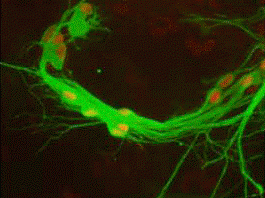Stephen Hawking was born on January 8th, 1942 in Oxford, England. He has used his education in physics, mathematics, and cosmology to study the basic laws which govern the universe. One of his most significant contributions to science was the conjecture that the universe has not boundary in imaginary time, which implies that the universe began completely according to the laws of science. As a result, Hawking has received many awards, medals and prizes for his academic work.
Stephen Hawking was diagnosed with Amyotrophic Lateral Sclerosis (ALS) when he was 21. According to the ALS Association (ALSA), ALS is a progressive neurodegenerative disease that affects motor neurons in the brain and spinal cord. Motor neurons stretch from the brain to the spinal cord and from the spinal cord to all the body’s muscles.


The gradual degeneration of the motor neurons in ALS eventually leads to their death, which restricts voluntary muscle action.
ALSA reports that the initial symptoms of ALS can vary between people, and the onset of the disease is quite gradual. Some possible symptoms include:
- Progressive muscle weakness
- Tripping
- Dropping things
- Abnormal fatigue of arms and/or legs
- Slurred speech
- Muscle cramps and twitches
The muscle weakness and paralysis can eventually affect the breathing muscles, leading to respiratory failure. The average survival time with ALS is 3 to 5 years.
In a class discussion, we addressed the difficult topic of what one would do if their family member was close to dying due to ALS. At this point, the degenerating breathing muscles can
- Is it worth the emotional and financial burden to keep a loved one with ALS alive by permanent ventilatory support?
- At what point would an individual with ALS, keenly cognizant of the damage from ALS to his or her body, wish to end their life?
- Should physician assisted suicide be considered as an option for ALS patients?
We never came to a consensus. At the end of the day, it might be a better use of one’s time to devote herself to researching such a destructive disease, in hopes of developing an effective cure or preventative treatment.
According to a review study by Bozzo, Mirra, and Carri (2016, there are 3 mechanisms that cause ALS and seem to function cyclically:
- Oxidative Stress
- Mitochondrial Damage
- RNA Dysmetabolism
Oxidative stress is a disturbance in the balance between reactive oxygen species and antioxidant defenses. It is characterized by protein aggregation in the cytosol by extra or permanent Stress Granules (SGs). SGs form under oxidative stress to quickly modulate gene expression.
Mitochondria show damage early in the neurodegeneration process of ALS. In fact, changes in the mitochondria can be detected before physical symptoms in ALS patients.
RNA dysmetabolism is caused by the delocalization of FUS and TDP43 from the nucleus into the cytosol. Aggregation, alternative splicing, and misfolding of these proteins are involved in RNA dysmetabolism.
Ultimately, ALS seems to be characterized by this vicious cycle of pathogenic mechanisms.
Currently, riluzole is the only drug approved to treat ALS. It helps decrease the progression of ALS, and it has helped increase the life expectancy of people with ALS. However, this drug does not work on everyone.
Stephen Hawking has managed to live 53 with a slow-progressing form of ALS. Being wheelchair-bound and reliant on a computerized voice system for communication has not held him back from remaining close with his family, continuing research endeavors, and traveling to give public lectures.
Yet, some are not this lucky, and the aggressive development of their ALS continues to limit their daily life until the very ability to live no longer exists.
